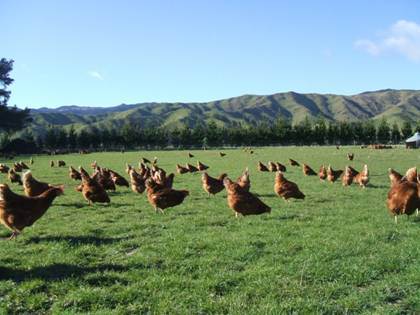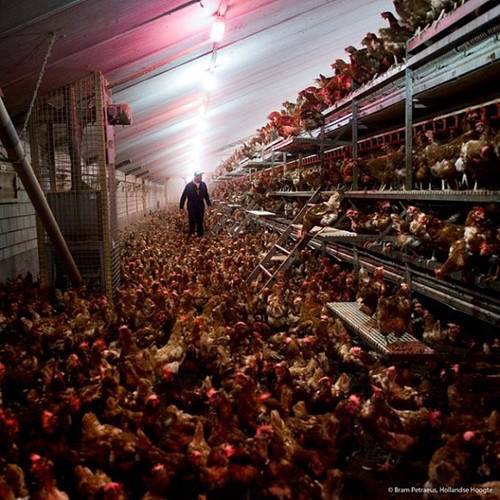 There’s a common perception today that eggs from free range hens are more nutritious than eggs from factory farmed, caged hens. The trendy terms, “free range”, “organic” and “cage free” became popular over the last 10 years and still command respect in the supermarket as healthy options. The cage-born eggs are usually the least expensive and most commonly consumed eggs in America. Studies however, have caused confusion as to whether there are nutritional benefits to these pricier eggs. Below are a three studies that yield different results. These studies will be referenced throughout the post.
There’s a common perception today that eggs from free range hens are more nutritious than eggs from factory farmed, caged hens. The trendy terms, “free range”, “organic” and “cage free” became popular over the last 10 years and still command respect in the supermarket as healthy options. The cage-born eggs are usually the least expensive and most commonly consumed eggs in America. Studies however, have caused confusion as to whether there are nutritional benefits to these pricier eggs. Below are a three studies that yield different results. These studies will be referenced throughout the post.
1. 2011 study from North Carolina State University found that there was no significant difference in vitamins or Omega-3 fatty acids when comparing eggs from free range hens to regular caged hens.
2. A study in 2003 by a Penn State researcher concluded that pastured hens lay eggs that have significantly higher in omega-3 fatty acids and in vitamins A and E in comparison to regular caged hen eggs.
3. Another study done by Mother Earth Magazine tracked 14 flocks raised on a variety of pastures and found significant nutritional differences between pastured hen eggs and regular caged hen eggs.
How are these results so different? Should people spend the extra money on free range eggs?
Comparing Apples To Oranges
Did you notice? The studies referenced above talk about 2 different things; “free range eggs” and “pastured eggs”. Are these the same? No….but the egg producers selling “free range eggs” would like you think they are. It’s also in their financial interest. The first study looked at eggs raised according to the USDA’s loose definition of “free range”. The 2nd and 3rd studies tested eggs from hens that actually grazed in pasture.
By posting these studies together, I did exactly what many egg companies and unknowing journalists do——I equated USDA “Free Range” eggs with eggs from hens that were pastured. Take a look at the The American Egg Board’s list of various egg production methods. They don’t bother to differentiate between free range and pastured eggs either.
How Does The USDA Define “Free Range Eggs”?
Unfortunately, large-scale egg producers have exploited the USDA’s weak definitions on free range chickens. In fact, the only thing that’s required by the USDA to be “free range” is that “producers must demonstrate to the Agency that the poultry has been allowed access to the outside”.
Let’s take a look…………………….
The Difference Between Free Range, Cage Free, Organic, and Pastured Eggs

Free Range Eggs
The lax definition means that producers can, and do, label their eggs as “free-range” even if all they do is leave a single doggy-door open in their huge chicken warehouses. They’re sold as “free range” regardless of whether the birds ever learn to go outside. There are no regulations on what the outside ‘free ranging’ area is. It may be a muddy yard without vegetation or cement platform. In addition, regulations on environmental quality, number of birds, square foot per bird, or de-beaking are not specified.
The pictures below show the stark difference between the consumer perception of “free range” and what the USDA actually authorizes.

Where most people think their free range eggs come from.

What Free range means from the USDA. (there’s a little outside door in there somewhere)
Cage Free Eggs
The certification is meaningless. Large egg producers will either pack thousands of hens into a barn with little space to move, or pack them in into cages with little space to move?
According to United Egg Producers,
“The amount of floor space available to each hen within an indoor house. Depending on the housing style, UEP Certified guidelines require that a minimum range of 1.0 – 1.5 square feet of usable floor space per hen be provided to allow for normal behavior.”
However, for sanitation reasons and overall flock health, keeping hens in cages may actually be better for flock health. This means the “cage free” label your eggs may actually mean a less ethical life for hens. Watch the video below to see what “cage free” actually means. It’s straight from United Egg Producers.
Also, let’s be clear, the term “cage free” is only relevant for the egg industry. Chickens and turkeys raised for meat in the U.S. are not, and never have been, raised in cages. All poultry raised for meat is cage free. The “cage free” label on poultry serves no other purpose than to capitalize and profit from consumers’ ignorance of industry rearing methods for meat birds. I posted more in detail on this a few months ago: How Labels on Chicken Meat are Intentionally Deceptive
Organic Eggs
In terms of poultry products, this is another certification that is essentially worthless now that it’s been bastardized by big business. Organic eggs come from hens fed a diet of corn and soy that was sprayed with organically certified pesticides, herbicides, fungicides and fertilizers instead of conventional synthetic products. These hens are also raptors that naturally thrive on a omnivorous diet of bugs, veggies and meat. They are not vegetarians.
The USDA Organic certification ensures the hens will continue to be packed into warehouses, live inhumane lives and follow the same lax regulations that qualify for “Free-Range”.
Pastured Eggs – The Real Deal
“Pastured” is not a certification. It only means that hens were allowed to spend much of their life outside exposed to pasture and areas where it could forage for seeds, insects and various greens. And chickens are NOT vegetarians. While pastured chickens are usually supplemented with a grain diet to bolster egg production, a chicken raised on pasture is the true free range! The best way to know how your chickens are raised is to visit or research your egg source. Check out “The Story of an Egg” below. It sums up what pastured eggs really are.
https://www.youtube.com/watch?v=6ITxuSnDEEg
Our chickens spend most of the day out pecking in the yard, eat our vegetable waste and even larvae from the compost. You see our hen-house setup here along with a video. Our Hen House in Costa Rica
What are the Nutritional Benefits of Pastured Eggs?
Study #2(refenced at the top), scientists at Pennsylvania State University found 2 1/2 times more omega-3s and twice the vitamin E in the eggs of pasture-raised hens (which were given feed as a supplement to their forage) than those of caged hens that were fed only standard commercial mash. “Leafy plants like grasses, white clover, red clover, alfalfa, and legumes contain more vitamins and unsaturated fatty acids than standard mash does,” says Heather Karsten, PhD, associate professor of crop and soil sciences at Penn State, who conducted the study.
Study #3 from Mother Earth News found that, compared to official U.S. Department of Agriculture (USDA) nutrient data for commercial eggs, eggs from hens raised on pasture may contain:
• 1/3 less cholesterol• 1/4 less saturated fat• 2/3 more vitamin A• 2 times more omega-3 fatty acids• 3 times more vitamin E• 7 times more beta carotene
These results come from 14 flocks around the country that range freely on pasture or are housed in moveable pens that are rotated frequently to maximize access to fresh pasture and protect the birds from predators. We had six eggs from each of the 14 pastured flocks tested by an accredited laboratory in Portland, Ore.
In addition:
• In 1974, the British Journal of Nutrition found that pastured eggs had 50 percent more folic acid and 70 percent more vitamin B12 than eggs from factory farm hens.
• A 1998 study in Animal Feed Science and Technology found that pastured eggs had higher omega-3s and vitamin E than eggs from caged hens.
• A 1999 study by Barb Gorski at Pennsylvania State University found that eggs from pastured birds had 10 percent less fat, 34 percent less cholesterol, 40 percent more vitamin A, and four times the omega-3s compared to the standard USDA data. Her study also tested pastured chicken meat, and found it to have 21 percent less fat, 30 percent less saturated fat and 50 percent more vitamin A than the USDA standard.
Conclusions
While it may seem that the studies I referenced could cause confusion, they shouldn’t. They’re not even comparable studies. If study #1 is comparing the eggs from caged hens packed in a warehouse to hens with a little access door to a dirt yard (USDA Free Range), you wouldn’t expect a nutritional difference. Both groups are raised in barns and fed an identical diet. Studies #2 and #3 are comparing the eggs from caged hens to hens that spend much of their day grazing in green pasture. You can imagine that pastured hens have a much more diversified diet. The results show in their eggs.
Don’t allow people or organizations to conflate the terms “free range”, “organic”, or “cage free” with “pastured”. There is a difference. Pastured hens produce eggs richer in vitamins and Omega-3 fatty acids. So far science supports this.
Sources:
Meet The Real Free-Range Eggs, Study of Eggs from 14 Pastured Flocks – Mother Earth News
Penn State 2003 “Pasture-ized” Study on Egg Nutrition By Heather Karsten PhD
The Science Is Settled: No Nutritional Difference Between Free-Range And Caged Chicken Eggs
1999 Penn State Pastured Eggs Study Letter From Barb Gorski
1998 “Effect of free-range feeding on omega-3 fatty acids and alpha-tocopherol content and oxidative stability of eggs.” Animal Feed Science and Technology 72: 33-40.



GIPHY App Key not set. Please check settings